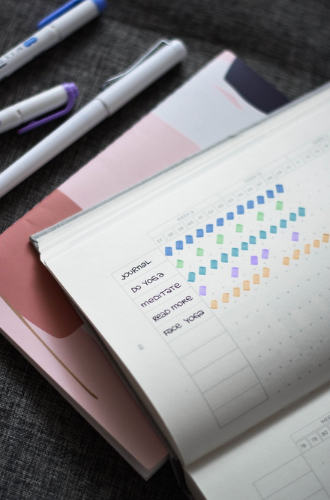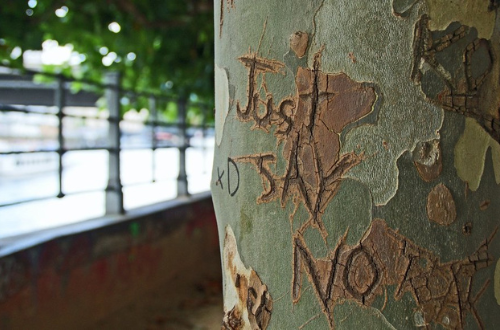9 Ways to Manage Stress as a Millennial
12 minute read.
Pebble in My Shoe.
Like a lot of you, I take daily walks to improve my cardiovascular health, get fresh air and to step away from my home office. On these walks across sometimes uneven surfaces, I often get pebbles in my shoes. I am talking about literal tiny rocks that get into my shoes, an experience so common that the phrase “pebble in my shoe” is used to explain something frustrating, painful or annoying.
Not wanting to go through the whole process of untying my shoe, leaning forward and drawing attention to myself, I would power through it and observe as the pebble bounced from the arch of my foot, to my heel, to my big toe. Sometimes the unspeakable would happen and the pebble would make its way into my sock.
A few months ago, I made the choice to take 20 seconds, loosen my shoe, and remove the pebble. It was a moment of discomfort and patience that resulted in instant relief. The rest of my walk was enjoyable and my other senses were able to take in my environment, as their focus was not being pulled toward discomfort with every step.
I like to think of this as the millennial experience. Not having the time, desire or sense of self-worth to take a moment to assess the situation to see what small things can be changed.
Oppression.
Some issues cannot simply be changed, such as inequality in our country by way of racism, sexism, classism, ableism, homophobia, transphobia and other malignant forms of oppression. But oppression is not a pebble in your shoe, oppression is what makes you think you cannot remove the pebble from your shoe, or that you are not worthy of removing the pebble from your shoe.
We are experiencing collective trauma. I am not just talking about the COVID-19 pandemic. I am talking about the continued stripping of rights of oppressed groups in our country, while the oppressors celebrate. The US has never been an easy place to live in for BI&POC, LGBTQIA+ folx, and the poor/working classes. And with worsening institutional conditions, the gap between oppressed and oppressor is widening, while more and more of us are falling into the oppressed category.
I do not say this to discourage you, I say this to validate that gnawing sense of dread and unhappiness you have been nursing over the last few years. We are not living in normal times, but you are certainly not alone. There has never been a better time to learn how to take care of yourself.
I hope that after reading this, you are able to take the damn pebble out of your shoe.
1. Routine.
Routines are helpful because they keep your time predictable in a time when not much else is. This can be a morning routine that includes tea, journaling and meditation; an evening routine that includes cooking, closing down the kitchen and a Digestif; or even a work routine with lunch right at 12 no matter what.
Keeping a routine is a great way to respect and honor your time, while enjoying the comfort of predictability and consistency.
Don’t have a lot of time for yourself? Find small ways to fit in routine, like your commute to work, how you make your kids’ breakfasts, how you greet your partner when she comes home at the end of the day. Find at least one thing that is consistent that gives you comfort, and foster it.
2. Say no.
I have written about saying “no” before - twice, in fact. At this time in our culture, your time and attention is doled out to external sources: work, school, friends, partners, family, hobbies, entertainment, side-hustles, chores/life maintenance, etc. We are encouraged to say yes to everything from experiences to working after we have hit our limit.
We are not encouraged to take time for ourselves. Ever worse, we are not taught how to take time for ourselves. Saying no can be demonized in the workplace, with family and in other settings. We can be labeled as selfish, lazy, uncaring or loners. A gentle reminder that there is nothing wrong with periodic selfishness, it means you are caring for yourself. I also encourage my clients to be lazy, or to relax without any intention of being productive.
3. Listen to your body.
What is it telling you? We are trained to think of bodily sensations like discomfort, injury and pain as inconveniences, rather than messages from our body. This is because rest is discouraged in our culture.
We live under a capitalist economic and political system, which values profit and production over quality and actual demand. This results in workers (like yourself) being made to believe that their value is based on their productivity. This belief is called internalized capitalism.
You may notice that while workplaces offer sick leave and paid time off (if you’re lucky), you will directly or indirectly be discouraged from using these benefits. This means ignoring symptoms of illness, signs of increased stress and burnout. It also means ignoring hunger, tiredness and even the need to use the restroom if your workload to is too heavy.
In healthcare, when working with a client/patient who is struggling, we use the acronym HALT, asking if the individual is Hungry, Angry, Lonely or Tired. This is a nice reminder that many of our problems can be solved if we are given time and space to check in with ourselves about our actual biological needs.
Your body will find ways to tell you that it is reaching its limit before you become ill, burn out or suffer a mental health crisis. This could manifest in GI distress, headaches, sleep/appetite issues, weight fluctuation, changes in libido, increased anxiety/depression, etc. If your body is trying to tell you something, that means it is working but it is reaching its limit.
Honor your health and your wellbeing by listening to your body. If you will not be penalized for it, take the day off to recuperate. If you are feeling stressed, step away from work for a few minutes. And please, take the bathroom breaks when you need them.
4. Loving-kindness.
Loving-kindness is a phrase used in and throughout many religious texts. In English, we define loving-kindness as “a feeling of benevolent affection”. The fostering of loving-kindness is essential in Buddhism (in the ancient language Pali, Metta; in the liturgical language Sanskrit, Maitri), where it is more of a state of being or attitude, achieved and grown with practice. (Here is a great article on the practice of loving-kindness in Buddhism.)
Author Barbara O'Brien quotes Buddhist scholar Acharya Buddharakkhita on Metta (or loving-kindness):
"The Pali word metta is a multi-significant term meaning loving-kindness, friendliness, goodwill, benevolence, fellowship, amity, concord, inoffensiveness and non-violence. The Pali commentators define metta as the strong wish for the welfare and happiness of others (parahita-parasukha-kamana). ... True metta is devoid of self-interest. It evokes within a warm-hearted feeling of fellowship, sympathy and love, which grows boundless with practice and overcomes all social, religious, racial, political and economic barriers. Metta is indeed a universal, unselfish and all-embracing love."
When we practice loving-kindness, we are wishing, hoping, sending, literally vibing peace, happiness and love towards those we come into contact with. It is an opportunity to resist defensiveness, internalized dislike and negative judgment. A chance to practice curiosity and spread love into spaces that may need it.
Practicing loving-kindness may look like forgiving someone for snapping at you, giving them space to open up about what is bothering them. It may look like resisting gossip about someone with a diffusing comment like, “It sounds like they’re having a very hard time.”
It looks like shifting our expectations from negative to positive. This does not mean that we have unreasonable expectations or that we are practicing toxic positivity. It means that if we choose positivity over negativity, things will work out differently.
5. Community.
Cultivating community with your neighbors, friends, family and others is an excellent way to manage stress. Many cultures in the US maintain thriving communities. Unfortunately, due to dominant white supremacy culture cultivating solely power and the pursuit of wealth, many millennials struggle to find their community. Keep in mind that most professional millennials exist in white supremacy culture, whether whiteness is a part of their identity or not.
In times of distress, celebration, grief, joy, pain, growth and humility, community is there to help keep you supported and held.
6. Hold onto what serves you. Let go of what doesn’t.
What “serves” (or doesn’t serve) you can be a person, an idea, a place or a thing. If something in your life isn’t serving you, it’s likely that there is fear in letting it go. Fear of being alone, causing harm, being judged and being wrong are all legitimate fears.
If you are able to let go of a person, place, thing, or idea that doesn’t serve you, do so with the idea that you are increasing your own happiness.
If you do not have the option to let go of something that doesn’t serve you, you may have issues with accessibility, be a member of an oppressed group, have experienced housing/income insecurity, in recovery from an abusive situation, etc. In this case, letting go of expectations that leave you feeling disappointed, or letting go of anger that inhibits your healing is a great place to start.
You can learn how to let go of anger by going to therapy, where you gain tools for managing painful feelings and thoughts, gain insight and have an unbiased and trained professional advocating for you.
Here, here, and here are some resources for affordable therapy as well as navigating out-of-network benefits if your therapist doesn’t take insurance. (If you are able, avoid sites like BetterHelp and Talkspace as they exploit their therapists and do not offer safe ethically safe conditions for clients.)
7. Live sustainably.
Let go of consumerism, it does not serve you. Learn how to consume less, buy things you need, donate/reuse what you don’t need anymore. Live in a way that can sustain you, while also treating the world and with kindness. Find creative ways to decrease your trash, start composting (many US cities have paid/free compost services). Learn how to sew so you can mend your own clothes, make linens to replace paper towels.
Start a community garden in your neighborhood, or a small garden on your roof deck. Use a window box or keep your own herbs in your studio apartment. Go to grocery stores less, and farmers markets more. Use less plastic.
As stated previously, consumerism is driven by our desire to live with more ease. In reality, we get so inundated with products that make our lives “easier”, that we actually become burnt out, suffering from analysis paralysis or decision fatigue.
For example, when we stopped using plastic wrap and switched to beeswax wraps, I was annoyed that I needed to hold the wax in place while it warmed. It takes about 5 seconds, but I was frustrated that I was giving my time away. With a nice reframe, I know that it takes 5 seconds to take a long, deep breath.
We have cut our trash production in half, and it feels good. It feels good to not need to put our trash cans out every week. It feels good to buy less plastic and recycle less. It feels good to dry larger or delicate laundry items on the clothesline. It feels good to make homemade gifts for special occasions rather than rushing to order something on amazon. It feels good to thrift for some furniture and use hand-me-downs, only paying for new big ticket items when we need to.
I like using recycled materials, I like using natural products. I like making things and being creative in how I oppose consumerism. I feel in control. I feel happier, I feel lighter. I took the damn pebble out of my shoe.
8. Treat your body with kindness.
Throughout the next 24 hours, I challenge you to pay attention to how you treat your body. Notice how you jerk around throughout the day, how hard/soft you brush your teeth and shampoo your hair. Pay attention to how quickly you eat and how much time you give yourself to wind down before bed.
Notice how you address your body during exercise, during sex, or even when you first get out of bed in the morning. You should even note how you scratch an itch or how you put your clothes on. How do you treat your body while completing chores or cooking?
After, I challenge you not to judge yourself. You may notice that you are hard on your body, and you may be thinking, “Wow, something else I do wrong.“ Please make space for yourself here to feel some empathy. We are taught to be rough with our bodies. We routinely hear harsh phrases including “push through the pain,“ “scrub vigorously,“ “walk it off,“ and “no pain no gain“ regarding our bodies.
We learn to treat our bodies like they are a problem to solve, rather than a friend that is with us for life. You only get one body. Whether you are non-disabled or living with a body and/or mind that has a disability, you only get one. It has been through everything with you. Take time to treat it with kindness and adoration.
9. Accept what is different.
You may have noticed that your interests have changed since pre-pandemic times. Your relationships, your values, the entertainment you consume, how you spend your free time, where you want to travel, where you stand on social justice issues, your political views, etc.
Personally, I don’t enjoy restaurants anymore because I know how exploited the workers are, I barely drink anymore, I can’t watch horror/post apocalyptic (unless it’s for my podcast), I have little desire to travel to Europe again because I’d rather invest in non-colonizing cultures, I try to boycott big-box stores I used to swear by and I periodically contemplate a nomadic lifestyle.
I am also the happiest I have ever been. Despite the rights of me and my loved ones being stripped left and right, worsening climate conditions and an ongoing pandemic, I have been able to find peace. My insomnia has improved, I read more, I have more energy, I am more patient and more calm. I believe this is because I have made more space to care about those that need it, the world and myself.
Things have changed for the worse for all of us (excluding billionaires), especially the lower/middle class, disabled, queer and BI&POC folx. Those who have love to give, need to give it. It is the only way our generation can continue on. And as the most diverse, empathetic, socially conscious generation, I have no doubt that we can create a culture that celebrates these attributes, allowing us to nourish each other fully.
Check-in
In what ways can you remove the proverbial pebble from your shoe?
I encourage you to slow down for the rest of the day. Consider what you’ve read here, take in what you’re ready to take in, and let the other pieces marinate. Remember that for millennials, living with less stress is not just a decision you make, but a healing process you endure.
Thank you for reading!
Email contact@teletherapywithsarah.com with questions/comments/concerns.
I provide therapy to professional millennials from working class backgrounds. I coach “Exploited Therapists” or therapists who have been exploited by managers, bosses and supervisors. I help them build their dream private practices.
Teletherapy in all corners of Pennsylvania from Philadelphia to Scranton to Erie to Pittsburgh.
Coaching for all citizens of the world.
Ready to get started? Click here, or reach out to contact@teletherapywithsarah.com for a free 20 minute consultation.
I do not work through insurance, but I provide superbills for EMDR therapy sessions and regular therapy sessions. Learn about getting reimbursement from your insurance provider here.
Very Best,
—Sarah (she/her)
*Disclaimer - This piece was written by a straight, cis, non-disabled, white woman. Intersectionality (coined by lawyer, civil rights advocate, scholar and philosopher Kimberlé Crenshaw) tells us that race, ethnicity, class, sexuality, gender, etc. that differ from the above identifiers encounter hardship and oppression at a much higher rate.*
Find a therapist:
includsivetherapists.com
therapyden.com
zencare.co
thrivingcampus.com
National Suicide Prevention Lifeline
Hours: Available 24 hours. Languages: English, Spanish. Learn more
1-800-273-8255
National Domestic Violence Hotline
1-800-799-SAFE (7233)
Text “START“ to 88788
https://www.thehotline.org/











